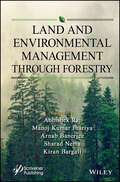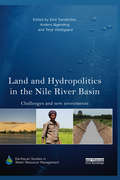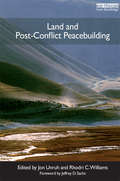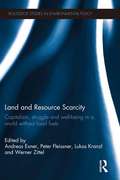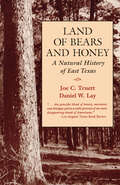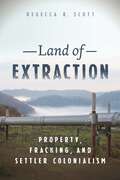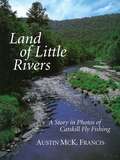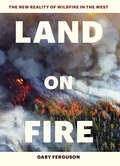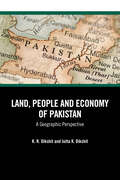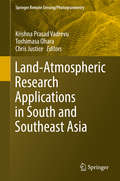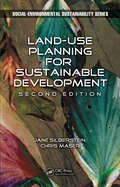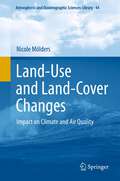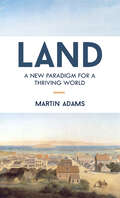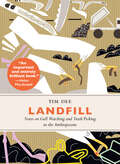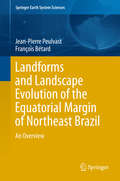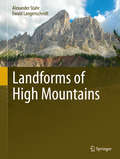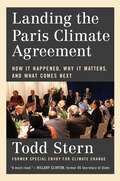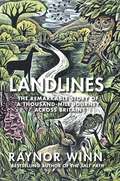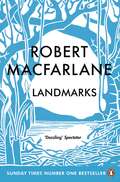- Table View
- List View
Land and Environmental Management Through Forestry
by Manoj Kumar Jhariya Arnab Banerjee Abhishek Raj Sharad Nema and Kiran BargaliLAND AND ENVIRONMENTAL MANAGEMENT THROUGH FORESTRY Written and edited by a group of experts in the field, this groundbreaking reference work sets the standard for engineers, students, and professionals working in forestry, agriculture, ecology, and environmental science, offering the scientific community a way toward combating climate change and land degradation. This outstanding new volume covers the diverse issues of land degradation around the world and its restoration through forestry, agroforestry, and other practices. The editors have integrated many different concepts and applications into a single place from which scientists, research scholars, academicians, and policymakers can be bene???t. New insights in this area are critical, as our very existence depends on forest sustainability and land restoration management. The work consists of chapters addressing the issues of land degradation, deforestation, intensive agricultural practices, sustainable intensification, soil and forest-related services, land and environmental management, and overall sustainability of the ecosystem. The contributors address current issues and their management through a holistic and integrated approach, presenting the context of land degradation and its problem, identifying the potential areas of research in the field of land restoration, identifying the land-based services and their potential role for ecosystem sustainability, creating awareness so that future policies can be framed for the betterment of human civilization, and addressing sustainable intensification for land and environmental management and service. A standard reference work for the disciplines of forestry, agriculture, ecology, and environmental science, it will also be a way forward for combating climate change. Useful to academics, researchers, ecologists, environmentalists, students, capacity builders, and policymakers, it is a must-have for any library.
Land and Hydropolitics in the Nile River Basin: Challenges and new investments (Earthscan Studies in Water Resource Management)
by Terje Oestigaard Emil Sandstrom Anders JagerskogThe Nile River Basin supports the livelihoods of millions of people in Egypt, Ethiopia, Sudan and Uganda, principally as water for agriculture and hydropower. The resource is the focus of much contested development, not only between upstream and downstream neighbours, but also from countries outside the region. This book investigates the water, land and energy nexus in the Nile Basin. It explains how the current surge in land and energy investments, both by foreign actors as well as domestic investors, affects already strained transboundary relations in the region and how investments are intertwined within wider contexts of Nile Basin history, politics and economy. Overall, the book presents a range of perspectives, drawing on political science, international relations theory, sociology, history and political ecology.
Land and Hydropolitics in the Nile River Basin: Challenges and new investments (Earthscan Studies in Water Resource Management)
by Terje Oestigaard Anders Jägerskog Emil SandströmThe Nile River Basin supports the livelihoods of millions of people in Egypt, Ethiopia, Sudan and Uganda, principally as water for agriculture and hydropower. The resource is the focus of much contested development, not only between upstream and downstream neighbours, but also from countries outside the region. This book investigates the water, land and energy nexus in the Nile Basin.It explains how the current surge in land and energy investments, both by foreign actors as well as domestic investors, affects already strained transboundary relations in the region and how investments are intertwined within wider contexts of Nile Basin history, politics and economy. Overall, the book presents a range of perspectives, drawing on political science, international relations theory, sociology, history and political ecology.
Land and Post-Conflict Peacebuilding (Post-Conflict Peacebuilding and Natural Resource Management)
by Jon Unruh Rhodri C. WilliamsClaims to land and territory are often a cause of conflict, and land issues present some of the most contentious problems for post-conflict peacebuilding. Among the land-related problems that emerge during and after conflict are the exploitation of land-based resources in the absence of authority, the disintegration of property rights and institutions, the territorial effect of battlefield gains and losses, and population displacement. In the wake of violent conflict, reconstitution of a viable land-rights system is crucial: an effective post-conflict land policy can foster economic recovery, help restore the rule of law, and strengthen political stability. But the reestablishment of land ownership, land use, and access rights for individuals and communities is often complicated and problematic, and poor land policies can lead to renewed tensions. In twenty-one chapters by twenty-five authors, this book considers experiences with, and approaches to, post-conflict land issues in seventeen countries and in varied social and geographic settings. Highlighting key concepts that are important for understanding how to address land rights in the wake of armed conflict, the book provides a theoretical and practical framework for policy makers, researchers, practitioners, and students. Land and Post-Conflict Peacebuilding is part of a global initiative to identify and analyze lessons in post-conflict peacebuilding and natural resource management. The project has generated six edited books of case studies and analyses, with contributions from practitioners, policy makers, and researchers. Other books in the series address high-value resources, water, livelihoods, assessing and restoring resources, and governance.
Land and Resource Scarcity: Capitalism, Struggle and Well-being in a World without Fossil Fuels (Routledge Studies in Environmental Policy)
by Andreas Exner Lukas Kranzl Peter Fleissner Werner ZittelThis book brings together geological, biological, radical economic, technological, historical and social perspectives on peak oil and other scarce resources. The contributors to this volume argue that these scarcities will put an end to the capitalist system as we know it and alternatives must be created. The book combines natural science with emancipatory thinking, focusing on bottom up alternatives and social struggles to change the world by taking action. The volume introduces original contributions to the debates on peak oil, land grabbing and social alternatives, thus creating a synthesis to gain an overview of the multiple crises of our times. The book sets out to analyse how crises of energy, climate, metals, minerals and the soil relate to the global land grab which has accelerated greatly since 2008, as well as to examine the crisis of profit production and political legitimacy. Based on a theoretical understanding of the multiple crises and the effects of peak oil and other scarcities on capital accumulation, the contributors explore the social innovations that provide an alternative. Using the most up to date research on resource crises, this integrative and critical analysis brings together the issues with a radical perspective on possibilites for future change as well as a strong social economic and ethical dimesion. The book should be of interest to researchers and students of environmental policy, politics, sustainable development and natural resource management.
Land of Bears and Honey: A Natural History of East Texas
by Joe C. Truett Daniel W. LayThis award-winning &“gem&” of a conservation classic tells the story of the land, wildlife, and ecology of East Texas (Quarterly Review of Biology).Winner of the Ottis Lock Endowment Award from the East Texas Historical Association; the Texas Literary Festival Award for Nonfiction from the Southwestern Booksellers Association & Dallas Times Herald; and the Annual Publication Award, Texas Chapter of the Wildlife Society As hickory groves and fox squirrels began to vanish from the East Texas landscape in the second half of the twentieth century, two biologists who specialized in wildlife and endangered species began work on Land of Bears and Honey. Their purpose was not only to eulogize what was lost, but to encourage us to save what we still can. The result is an &“elegant chronicle of the natural history of a once-rich area [that] will appeal strongly to birders, ecologists, to anyone who enjoys the outdoors&” (Publishers Weekly). &“This deceptively slender volume is three things: a how-to-book, an aesthetic feast and a moral tale.&” —Dallas Morning News &“To compare the style and content of this little book to that of the late Aldo Leopold is indeed high praise, yet the reviewer finds this comparison valid.&” —Quarterly Review of Biology &“In Land of Bears and Honey, East Texans have their own regional Walden, written with keen historical perspectives, literary style, and deep respect for the land.&” —East Texas Historical Journal &“This graceful blend of history, narrative and dialogue paints a noble portrait of one more disappearing chunk of Americana.&” —Los Angeles Times Book Review
Land of Bears and Honey: A Natural History of East Texas
by Joe C. Truett Daniel W. LayThis award-winning &“gem&” of a conservation classic tells the story of the land, wildlife, and ecology of East Texas (Quarterly Review of Biology).Winner of the Ottis Lock Endowment Award from the East Texas Historical Association; the Texas Literary Festival Award for Nonfiction from the Southwestern Booksellers Association & Dallas Times Herald; and the Annual Publication Award, Texas Chapter of the Wildlife Society As hickory groves and fox squirrels began to vanish from the East Texas landscape in the second half of the twentieth century, two biologists who specialized in wildlife and endangered species began work on Land of Bears and Honey. Their purpose was not only to eulogize what was lost, but to encourage us to save what we still can. The result is an &“elegant chronicle of the natural history of a once-rich area [that] will appeal strongly to birders, ecologists, to anyone who enjoys the outdoors&” (Publishers Weekly). &“This deceptively slender volume is three things: a how-to-book, an aesthetic feast and a moral tale.&” —Dallas Morning News &“To compare the style and content of this little book to that of the late Aldo Leopold is indeed high praise, yet the reviewer finds this comparison valid.&” —Quarterly Review of Biology &“In Land of Bears and Honey, East Texans have their own regional Walden, written with keen historical perspectives, literary style, and deep respect for the land.&” —East Texas Historical Journal &“This graceful blend of history, narrative and dialogue paints a noble portrait of one more disappearing chunk of Americana.&” —Los Angeles Times Book Review
Land of Extraction: Property, Fracking, and Settler Colonialism
by Rebecca R. Scott2024 Outstanding Academic Title, given by Choice ReviewsExplores fracking’s dual impact on settler colonial culture and sustainabilityThrough meticulous research and poignant storytelling, Land of Extraction unravels the complex web of relationships between humans, places, and the environment, all bound by the concept of private property. It presents a thought-provoking analysis of how settler colonial culture imposes limits on environmental politics.Drawing on real-life events, fictional portrayals of fossil-fuel driven apocalypses, and firsthand ethnographic accounts of the fracking and pipeline boom in West Virginia, Rebecca R. Scott argues that the American dream’s promise of empowerment through property ownership actually restricts action against extractive industries and hampers the progress of environmental justice coalitions.As the ever-expanding reach of natural gas and pipeline industries takes its toll on communities, the book reveals the fractures in landowners’ reliance on private property, opening the door to more sustainable futures. A powerful call to reevaluate our perspectives and challenge the status quo, this book will leave readers questioning the foundations of our society and the possibilities that lie ahead.
Land of Little Rivers: A Story in Photos of Catskill Fly Fishing
by Enrico Ferorelli Austin M. FrancisThe Beaverkill, Willowemoc, Neversink, Esopus, Schoharie, and Delaware--the rivers of angling pioneers Thaddeus Norris, Robert Barnwell Roosevelt, Theodore Gordon, and many others--are celebrated in this gorgeous book of photographs and text. In three major sections, Land of Little Rivers presents historical and physical profiles of the rivers; classic rods, reels, and flies; and engaging stories of the people, events, and developments that constitute the Catskill fly-fishing tradition.Complementing its photographic beauty, Land of Little Rivers is a book of substance, filled with fascinating stories, anecdotes, and nuggety captions. Land of Little Rivers is the product of author Francis's twenty-five years of research and writing about Catskill fly fishing, and of photographer Ferorelli's more than thirteen thousand images, from which has been selected the most evocative portfolio of photos ever made of these historic rivers. Together they have produced an exquisite, museum-quality work, one that captures magnificently the beauty and passion so central to the sport Izaak Walton called "the gentle art."
Land on Fire: The New Reality of Wildfire in the West
by Gary FergusonWildfire season is burning longer and hotter, affecting more and more people, especially in the west. Land on Fire explores the fascinating science behind this phenomenon and the ongoing research to find a solution. This gripping narrative details how years of fire suppression and chronic drought have combined to make the situation so dire. Award-winning nature writer Gary Ferguson brings to life the extraordinary efforts of those responsible for fighting wildfires, and deftly explains how nature reacts in the aftermath of flames. Dramatic photographs reveal the terror and beauty of fire, as well as the staggering effect it has on the landscape.
Land, People and Economy of Pakistan: A Geographic Perspective
by K. R. Dikshit Jutta K. DikshitThe book unravels the complexity of Pakistan’s physical terrain, from the Arabian Sea coast to the Himalayan heights, focusing on its bio-climatic environment. While throwing light on the evolution of societal organisation and the nature and intensity of economic enterprises, it discusses the human response to the natural milieu and the way natural resources have been harnessed.This volume discusses the distribution of natural resources and deciphers the evolutionary development of manufacturing, transport and trade, the main non-agricultural enterprises, and looks at the potential for their growth. It provides an overview of the country`s economy and its fluctuations through different political regimes. It also investigates the country’s diverse social, linguistic, and ethnic composition. A habitat study, incorporating villages and towns and their numerical and spatial distribution and also the hierarchical organisation of rural society have received a special focus in the book.The book, with its qualitative and quantitative information, will be useful to students, teachers and researchers studying physical geology, climatology, hydrology, soil science, environmental studies, archaeology, sociology, economics, demography, area studies and regional development studies. It will also be an indispensable companion to professionals in floral-landscaping, habitat study, administrators, and policymakers.
Land, Stewardship, and Legitimacy
by Andrea OliveCanada and the United States are similar in terms of the species of wildlife that mingle freely across their shared border. Despite this similarity, however, there are significant differences between approaches to wildlife management in these two nations. In Land, Stewardship, and Legitimacy, Andrea Olive examines the divergent evolution of endangered species policy on either side of the 49th parallel.Examining local circumstances in areas as distant and diverse as southern Utah and the Canadian Arctic, Olive shows how public attitudes have shaped environmental policy in response to endangered species law, specifically the Species at Risk Act in Canada and the Endangered Species Act in the U.S. Richly researched and accessibly written, this is the first book to compare endangered species policy on both sides of the Canada-U.S. border. It will appeal to students and scholars of environmental policy, politics, and ethics, and anyone interested in current approaches to wildlife management.
Land-Atmospheric Research Applications in South and Southeast Asia (Springer Remote Sensing/photogrammetry Ser.)
by Krishna Prasad Vadrevu Toshimasa Ohara Chris JusticeThis edited volume sheds new light on the impact of rapid Land Use/Cover Changes (LU/CC) on greenhouse gases (GHG’s) and aerosol emissions in South and Southeast Asia. Several countries in South/Southeast Asia have the highest population growth rates in the world, which is the main cause for LU/CC. Conversion of dense forests to agricultural areas and then to residential and urban areas is most commonly observed in South/Southeast Asian countries with a significant release of GHG’s and aerosols. The book showcases several case studies on the use of remote sensing and geospatial technologies to quantify biomass burning and air pollution impacts, aerosol pollution, LU/CC, and impacts on ecosystem services. The book also includes articles on regional initiatives in research, capacity building, and training. The authors of this book are international experts in the field, and their contributions highlight significant drivers and impacts of air pollution in South/Southeast Asia. Readers will discover the latest tools and techniques, in particular, the use of satellite remote sensing and geospatial technologies for quantifying GHG’s, aerosols and pollution episodes in this region.
Land-Use Planning for Sustainable Development (Social Environmental Sustainability)
by Chris Maser Jane Silberstein M.A.Thirteen years ago, the first edition of Land-Use Planning for Sustainable Development examined the question: is the environmental doomsday scenario inevitable? It then presented the underlying concepts of sustainable land-use planning and an array of alternatives for modifying conventional planning for and regulation of the development of land. Th
Land-Use and Land-Cover Changes
by Nicole MöldersWildfires, changing glaciers, deforestation, open-pit mining, increasing demands for food and bio-fuel production and the growth of megacities change our landscape. The book comprehensively reviews the current knowledge on how natural and anthropogenic land-use/cover changes affect weather, air quality and climate worldwide and explains how these changes may trigger further land-use/cover changes. It discusses how anthropogenic land-use/cover changes have affected local and regional climate and air quality since the settlement of America and the industrialisation. It addresses the topic how long-range transport of pollutants and dust of devasted areas as well as teleconnections may cause changes far away from the areas where the land-use/cover changes occurred, for which land-use/cover change may become an international issue similar to CO2. It also discusses relations to global change and future societal and scientific challenges related to land-use/cover changes.
Land: A New Paradigm for a Thriving World
by Martin AdamsWhat if we lived in a world where everyone had enough? A world where everyone mattered and where people lived in harmony with nature? What if the solution to our economic, social, and ecological problems was right underneath our feet? Land has been sought after throughout human history. Even today, people struggle to get onto the property ladder and view real estate as an important way to build wealth. Yet, as the reader will discover through this book, the act of owning land—and our urge to profit from it—causes economic booms and busts, social and cultural decline, and environmental devastation. Land: A New Paradigm for a Thriving World introduces a radically new economic model that ensures a more fair and abundant reality for everyone. It is a book for those who dream of a better world, for themselves and future generations.Table of ContentsIntroduction Part I: The Cost of Ignorance1. The Production of Wealth 2. The Value of Location3. The Free Market4. Social Decline5. Business Recessions6. Ecocide7. Earth, Our HomePart II: A New Paradigm for a Thriving World8. Restoring Communities9. Keep What You Earn, Pay for What You Use10. Local Autonomy11. Affordable Housing12. Thriving Cities13. Sustainable Farming14. The Price of Peace15. A New ParadigmEpilogue: A Personal NoteAppendix: The Math Behind the ScienceReferences & Suggestions for Further ReadingEndnotesIndex
Landfall
by James BradleyA gripping near-future thriller exploring the detrimental effects of climate change on ordinary lives.
Landfalls: A Novel
by Naomi J. WilliamsAn epic voyage, undertaken with the grandest of ambitions.Lapérouse leaves France in the Spring of 1785 with two ships under his command, knowing that he sails with the full backing of the French government. This is to be a voyage of scientific and geographical discovery - but every person on board has their own hopes, ambitions and dreams. As the ships move across vast distances in their journey of nearly four years, the different characters step forward and invite us into their world. From the remote Alaskan bay where a dreadful tragedy unfolds, to the wild journey Barthélemy de Lessups undertakes from the far east of Russia to St Petersburg, the reader is irresistibly drawn into a extraordinarily vivid world. Landfalls is a profoundly moving and intensely evocative novel about scientific exploration, human endeavour and individual tragedy,
Landfalls: A Novel
by Naomi J. WilliamsThe gripping story of a dramatic eighteenth-century voyage of discovery from Naomi J. WilliamsIn her wildly inventive debut novel, Naomi J. Williams reimagines the historical La Pérouse expedition, a voyage of exploration that left Brest in 1785 with two frigates, two hundred men, and overblown Enlightenment ideals and expectations, in a brave attempt to circumnavigate the globe for science and the glory of France. Deeply grounded in historical fact but refracted through a powerful imagination, Landfalls follows the exploits and heartbreaks not only of the men on the ships but also of the people affected by the voyage-natives and other Europeans the explorers encountered, loved ones left waiting at home, and those who survived and remembered the expedition later. Each chapter is told from a different point of view and is set in a different part of the world-ranging from London to Tenerife, Alaska to remote South Pacific islands and Siberia, and eventually back to France. The result is a beautifully written and absorbing tale of the high seas, scientific exploration, human tragedy, and the world on the cusp of the modern era. By turns elegiac, profound, and comic, Landfalls reinvents the maritime adventure novel for the twenty-first century.
Landfill: Notes on Gull Watching and Trash Picking in the Anthropocene
by Tim Dee"There&’s love and death here, fear, fascination, hope, and the breaking of the world. Dee has written an absolute triumph.&”―Helen Macdonald, author of H Is for HawkOver the past hundred years, gulls have been brought ashore by modernity. They now live not only on the coasts but in our slipstream following trawlers, barges, and garbage trucks. They are more our contemporaries than most birds, living their wild lives among us in towns and cities. In many ways they live as we do, walking the built-up world and grabbing a bite where they can. Yet this disturbs us. We&’ve started fearing gulls for getting good at being among us. We see them as scavengers, not entrepreneurs; ocean-going aliens, not refugees. They are too big for the world they have entered. Their story is our story too. Landfill is the original and compelling story of how in the Anthropocene we have learned about the natural world, named and catalogued it, and then colonized it, planted it, or filled it with our junk. While most other birds have gone in the opposite direction, hiding away from us, some vanishing forever, gulls continue to tell us how the wild can share our world. For these reasons Landfill is the nature book for our times, groundbreaking and genre-bending. Without nostalgia or eulogy, it kicks beneath the littered surface of the things to discover stranger truths. "In his delightful jaunt through gull taxonomy, behavior, and lore, Tim Dee casts his feathered protagonists as indomitable heroes of the Anthropocene―thriving in our cities, colonizing our culture, and repurposing our trash as treasure. Next time a gull snatches your fries, you&’ll find yourself not cursing a petty thief, but admiring one of our planet&’s grittiest, savviest survivors.&”―Ben Goldfarb, author of Eager and Crossings
Landforms and Landscape Evolution of the Equatorial Margin of Northeast Brazil
by Jean-Pierre Peulvast François BétardMore than a simple monograph, the authors present a comprehensive geomorphic overview of a large tropical region where they show how deciphering the long-term landform evolution helps understanding the present set of landscapes and morphodynamic environments. The Equatorial margin of the Brazilian "Nordeste" displays stratigraphic landmarks whose interpretation reveals the age and nature of landforms, leading to a reconstruction of the geomorphic history by the means of combined morphostratigraphic and morphopedological approaches. Beyond the role of differential erosion related to moderate post-oceanic opening uplift, the plain and upland landscape reflects a juxtaposition of landform and soil generations related to a shallow basin inversion, the last stages of which occurred in semi-arid conditions since the Oligocene. These results throw light on old debates on models of long-term landform development in platform areas, and also help evaluating recent models of denudation and burial based on thermochronological methods.
Landforms of High Mountains
by Alexander Stahr Ewald LangenscheidtThis image atlas and reference book is written in simple language that can be understood by a broad audience. The work comprehensively explains the geomorphological forms of high mountains using many examples like glacial erosion forms and deposits such as moraines and gravel terraces, which are illustrated with numerous photographs. Landslide landscapes, volcanoes, weathering, and erosion are other examples discussed. These examples are from across the world, including the Himalayas, the Alps, the Andes, and the Southern Alps of New Zealand. This work is useful for laymen who are interested in geosciences, especially high-mountain landforms, as well as for students and teachers of earth sciences.
Landing the Paris Climate Agreement: How It Happened, Why It Matters, and What Comes Next
by Todd SternFrom the U.S. lead negotiator on climate change, an inside account of the seven-year negotiation that culminated in the Paris Climate Agreement in 2015—and where the international climate effort needs to go from here.The 2015 Paris Agreement on climate change was one of the most difficult and hopeful achievements of the twenty-first century: 195 nations finally agreed, after 20 years of trying, to establish an ambitious, operational regime to address one of the greatest civilizational challenges of our time. In Landing the Paris Climate Agreement, Todd Stern, the chief US negotiator on climate change, provides an engaging account from inside the rooms where it happened: the full, charged, seven-year story of how the Paris Agreement came to be, following an arc from Copenhagen, to Durban, to the secret U.S.-China climate deal in 2014, to Paris itself. With a storyteller’s gift for character, suspense, and detail, Stern crafts a high-stakes narrative that illuminates the strategy, policy, politics, and diplomacy that made Paris possible. Introducing readers to a vivid cast of characters, including Xie Zenhua, Vice Minister of China’s National Development and Reform Commission, Bo Lidegaard, chief strategist for Denmark’s Prime Minster, and Indian minister Jairam Ramesh, Stern, who worked alongside President Barack Obama and Secretaries of State John Kerry and Hillary Clinton, depicts the pitfalls and challenges overcome, the shifting alliances, the last-minute maneuvering, and the ultimate historic success. The book concludes with a final chapter that describes key developments since 2015 and the author’s reflections on what needs to be done going forward to contain the climate threat.A unique peek behind the curtain of one of the most important international agreements of our time, Landing the Paris Climate Agreement is a vital and fascinating read for anyone who cares about the future of our one shared home.
Landlines: The Remarkable Story of a Thousand-Mile Journey Across Britain
by Raynor WinnThe powerful story of a 1,000-mile healing walk—from the lochs of Scotland to England's southwest coast—in a remarkable evocation of modern-day Britain.Raynor Winn knows that her husband Moth&’s health is declining, getting worse by the day. She knows of only one cure. It worked once before. But will he—can he?—set out with her on another healing walk? The Cape Wrath Trail is hundreds of miles of grueling terrain through Scotland's remotest mountains and lochs. But the lure of the wilderness and the beguiling beauty of the awaiting glens draw them northwards. Being one with nature saved them in their darkest hour years earlier—and their hope is that this experience can work its magic again. So Raynor and Moth embark on an incredible thousand-mile journey: from Scotland to the familiar shores of the South West Coast Path, from Northumberland to the Yorkshire moors, and from Wales to home again. As they map with each step the landscape of their island nation, they find themselves facing existential questions—about themselves and about their country—during this epic, inspiring odyssey.
Landmarks
by Robert MacfarlaneSHORTLISTED FOR THE SAMUEL JOHNSON PRIZESHORTLISTED FOR THE WAINWRIGHT PRIZEFrom the bestselling author of UNDERLAND, THE OLD WAYS and THE LOST WORDS'Few books give such a sense of enchantment; it is a book to give to many, and to return to repeatedly' Independent 'Enormously pleasurable, deeply moving. A bid to save our rich hoard of landscape language, and a blow struck for the power of a deep creative relationship to place' Financial Times'A book that ought to be read by policymakers, educators, armchair environmentalists and active conservationists the world over' Guardian 'Gorgeous, thoughtful and lyrical' Independent on Sunday'Feels as if [it] somehow grew out of the land itself. A delight' Sunday TimesDiscover Robert Macfarlane's joyous meditation on words, landscape and the relationship between the two.Words are grained into our landscapes, and landscapes are grained into our words. Landmarks is about the power of language to shape our sense of place. It is a field guide to the literature of nature, and a glossary containing thousands of remarkable words used in England, Scotland, Ireland and Wales to describe land, nature and weather.Travelling from Cumbria to the Cairngorms, and exploring the landscapes of Roger Deakin, J. A. Baker, Nan Shepherd and others, Robert Macfarlane shows that language, well used, is a keen way of knowing landscape, and a vital means of coming to love it.
